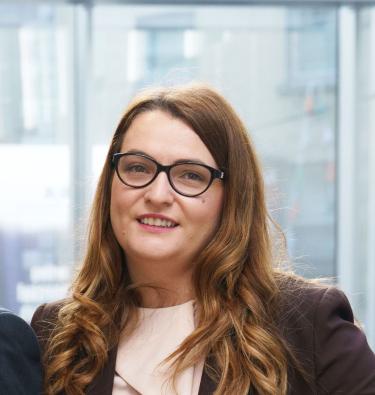
In Ireland, 94% of pilot licence holders and 98% of maintenance licence holders are male. This ratio is only marginally better in air navigation service providers, where just 20% of Air Traffic Control officers are female.
According to the same data, gathered by the International Air Transport Association (IATA), among all categories of C-suite positions in airlines, there is a low representation of women: just 6-13%. (Except for Human Resources where 40% of directors are women.)
The icon on this article reflects the research's contribution to UN Sustainable Development Goal 5: Gender Equality. The Sustainable Development Goals are 17 objectives designed by the United Nations to serve as a shared blueprint for peace and prosperity for people and the planet.
Diversity and success
Diversity is not just a metric to strive for; It is an integral part of an organisation’s success. A diverse workforce improves decision-making processes by increasing creativity and innovation. Heterogeneous groups are more likely to possess a broader array of task-related knowledge and experiences and benefit from an enhanced perspective, especially when planning and executing business strategy.
Organisations that emphasise attracting, retaining, and promoting both an ethnically and gender diverse workforce report increased performance as a direct result of these efforts.
Dublin City University has partnered with the Department of Transport, the Irish Aviation Authority, airlines, airports and aircraft leasing companies among others for this study, which is the first of its kind in Ireland. The aim is to gather data to give aviation companies insights and tools to advance diversity in the workplace.
The research
The research involved two surveys: one for Human Resources departments and one for Employees. The first survey sought an organisational view from fourteen HR departments in the aviation industry to assess existing diversity and inclusion strategies, demographic data and information on policies and procedures.
The second survey focused on gathering employees’ experiences and their views on support, policies and development. Of the 450 employees, from all roles and parts of the industry, who filled out this survey, 76% lived in Ireland. The remaining 24% came from 31 different countries, and their data was used comparatively where possible.
This quantitative research investigated all areas of the aviation industry including airlines, airports, Maintenance Repair and Overhaul organisations (MROs), aircraft leasing, Air Navigation Service Providers and aircraft manufacturing.
The need for progress
The surveys yielded some stark results: over half of respondents (55.7%) had experienced or witnessed discrimination in the aviation industry, most of whom were females (68%)
More than three quarters of the respondents thought that their colleagues are accepting of other people whatever their background is, but 17.8% do not feel that there is this level of acceptance.
It is clear from the responses that collectively the industry is at an early stage in its diversity and inclusion journey. Half of the companies reported having started a diversity & inclusion process, with 25% of these reaching an intermediate level.
While only 23% reported having a diversity & inclusion strategy, over 90% do not have a budget allocated to diversity & inclusion. A positive finding is that 33.9% of respondents felt their senior manager takes diversity & inclusion seriously in the way they behave and the things they say.
Impact
The research demonstrates that aviation organisations need to take ownership of diversity and inclusion and make it a key priority. The study has identified 3 key priorities for organisations to consider when beginning or aiming to make fast progress on diversity and inclusion processes.
1. Equity, Diversity, and Inclusion (EDI) should be a focus of the senior leadership agenda with dedicated resources assigned and objectives aligned to the business. Dedicated budget for EDI will support the prioritisation of EDI and allow companies to be creative and build inclusive environments.
2. Be accountable: identify priority areas, establish benchmarks, set and measure KPIs. Data insights will enable organisations to create roadmaps and clearly assess how and where to focus their attention and resources, while tracking progress over time.
3. Action: organisations need to act now. Key initiatives organisations could provide include internal and external training and development opportunities for all employees and especially females, as well as life coaching, educational scholarships, and sponsor and mentor programs.
The study can be found here: https://business.dcu.ie/wp-content/uploads/2023/06/Irish-Aviation_A-focus-on-Gender-Diversity_public1-1.pdf




